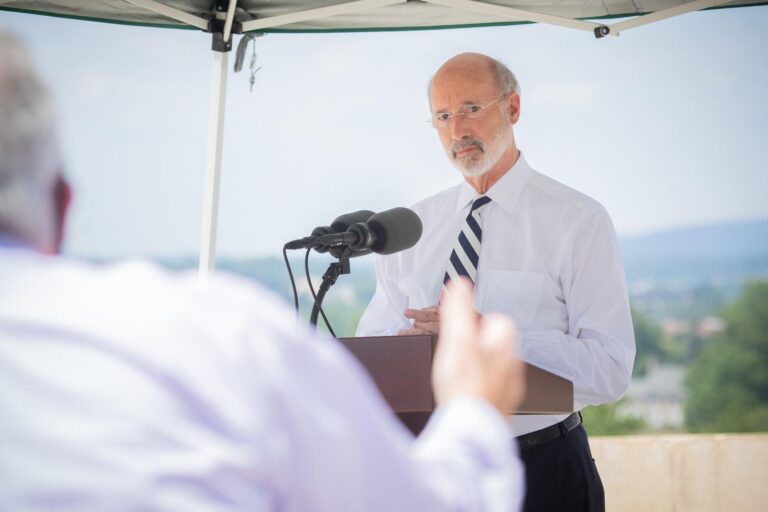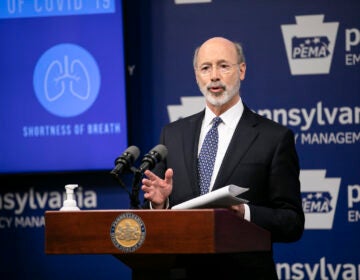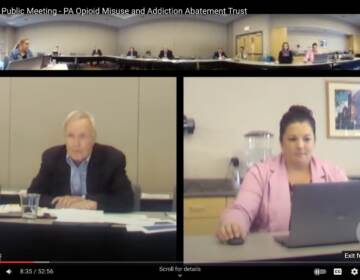Gov. Tom Wolf will allow transparency bill to become law despite veto threat
Wolf had argued Grove’s bill was flawed and would endanger state workers by forcing them to return to offices during an emergency, like the current pandemic.

Gov. Tom Wolf (Commonwealth Media Services)
This story originally appeared on Spotlight PA.
___
Spotlight PA is an independent, non-partisan newsroom powered by The Philadelphia Inquirer in partnership with PennLive/The Patriot-News and other news organizations across Pennsylvania. Sign up for our free weekly newsletter.
After facing months of questions about his administration’s transparency during the coronavirus pandemic, Gov. Tom Wolf will allow a bill that ensures access to public records during declared emergencies to become law without his signature.
Despite the legislation’s unanimous approval in the General Assembly, Wolf had repeatedly threatened to veto the measure.
“While I am still very concerned about the ill-conceived and poorly drafted legislation as it pertains to protections for critical security and infrastructure during an emergency, I am going to err on the side of transparency, as I have done throughout my term, and let this bill become law,” Wolf said in a statement Sunday.
Republicans in the legislature have complained bitterly for months that Wolf has shielded important information about his administration’s decision-making while responding to the public health crisis. The dispute has even led some GOP lawmakers to sue the administration for records related to a controversial waiver program that allowed some businesses to reopen during the shutdown while others had to remain closed.
Rep. Seth Grove (R., York) introduced the measure after agencies under Wolf’s purview temporarily stopped processing requests made under the Right-to-Know Law in mid-March as the governor ordered a statewide shutdown.
Wolf had argued Grove’s bill was flawed and would endanger state workers by forcing them to return to offices during an emergency, like the current pandemic or a natural disaster.
“If people can’t get into the offices to actually look for something that somebody wants to know through a Right-to-Know, that makes it really hard to happen,” he said at a recent press conference. “So it’s an impractical bill ”
But by Friday, as editorial boards and lawmakers publicly pressured the governor to sign the measure, Wolf’s tone had shifted slightly.
“If I can be assured that this can be implemented in a way that is safe for the employees, then it’s not a bad choice,” he said at a press briefing in Lancaster. “We’ve got to be able to be open and transparent and keep our employees safe.”
According to Grove and the bill’s supporters including the ACLU of Pennsylvania, the legislation provides for necessary flexibility by directing the state Office of Open Records to set guidelines.
“The goal is to weigh employee safety with transparency,” Grove said in a statement. “OOR can do that as they work with requesters and agencies on a daily basis.”
Erik Arneson, executive director of the Office of Open Records, said in a statement “any guidelines published by the OOR would protect the health and safety of agency employees.” In an email to Spotlight PA, Arneson said he discussed Wolf’s concerns about employee safety with a member of the governor’s staff.
“I am still worried that the provisions of [the legislation] will needlessly put commonwealth employees in possible danger retrieving records to meet an arbitrary timeline,” Wolf said in a statement. “This concern is heightened because legislators, by example, have wantonly endangered their own employees by having them come in to work when telecommuting would be adequate, have tried to force workers throughout the state back to work without adequate protection, and have refused to follow basic public health advice such as wearing masks.”
The state’s public-records law requires government agencies to respond to requests within five days, though they can seek a 30-day extension. But as Wolf shut down businesses and put in place stay-at-home orders to contain the spread of COVID-19, several state agencies said they could no longer process requests.
Lyndsay Kensinger, a spokesperson for Wolf, said the administration resumed processing requests in May, and that all made during the first few weeks of the pandemic — 22 in total — have since been considered.
Wolf and his office also expressed concern the bill would force the disclosure of sensitive information, including private health data and records related to critical infrastructure, emergency operation plans, and trade secrets of private entities.
The bill specifies that information related to disaster declarations, including data state agencies use to set policies or take actions during an emergency, should be considered public records. But there are provisions in the open-records law and Grove’s bill that protect proprietary and confidential information, according to Melissa Melewsky, media law counsel for the Pennsylvania NewsMedia Association.

Get daily updates from WHYY News!
(Spotlight PA is a Pennsylvania NewsMedia Association member.)
During a Monday press conference with Grove, Melewsky said there is a heightened interest in governmental operations during times of emergency.
“When we’re dealing with extraordinary circumstances, we need extraordinary law to protect transparency in Pennsylvania,” Melewsky said. “Unfortunately, what our members ask for isn’t always provided, and in those situations, the public’s only option is to fall back on the Right-to-Know Law, and if that’s not active, that can leave a significant hole in transparency.”
While he will allow the bill to become law, Wolf said in a statement Sunday he considers it “no more than a talking point for many in the General Assembly.” He called on the legislature to pass another measure that would make lawmakers’ now-secret emails and calendars available to the public.
(Spotlight PA is a Pennsylvania NewsMedia Association member.)
During a Monday press conference with Grove, Melewsky said there is a heightened interest in governmental operations during times of emergency.
“When we’re dealing with extraordinary circumstances, we need extraordinary law to protect transparency in Pennsylvania,” Melewsky said. “Unfortunately, what our members ask for isn’t always provided, and in those situations, the public’s only option is to fall back on the Right-to-Know Law, and if that’s not active, that can leave a significant hole in transparency.”
While he will allow the bill to become law, Wolf said in a statement Sunday he considers it “no more than a talking point for many in the General Assembly.” He called on the legislature to pass another measure that would make lawmakers’ now-secret emails and calendars available to the public.
 100% ESSENTIAL: Spotlight PA relies on funding from foundations and readers like you who are committed to accountability journalism that gets results. If you value this reporting, please give a gift today at spotlightpa.org/donate.
100% ESSENTIAL: Spotlight PA relies on funding from foundations and readers like you who are committed to accountability journalism that gets results. If you value this reporting, please give a gift today at spotlightpa.org/donate.
WHYY is your source for fact-based, in-depth journalism and information. As a nonprofit organization, we rely on financial support from readers like you. Please give today.



![CoronavirusPandemic_1024x512[1]](https://whyy.org/wp-content/uploads/2020/03/CoronavirusPandemic_1024x5121-300x150.jpg)


